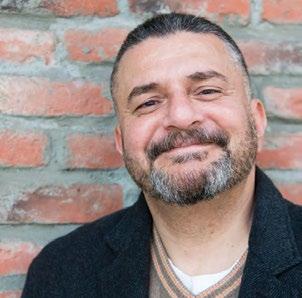
4 minute read
That Persistence of Vision
An Interview with Yussef El Guindi during January rehearsals at A Contemporary Theatre in Seattle
ACT: Your characters feel so real; even just reading the script, they jump off the page. What do you do to fill out their backstories/lives while planning them? Thank you for saying that. I don’t plan or overthink them, or the play as a whole. Usually, the spur to writing is the aliveness of some characters that nudge their way into my waking life. They hang out with me as I go about my day, getting ever louder and more insistent, presenting me with hints of what they’re about, where they are and what they want. Even the latter can be vague. But it’s that persistence of vision, if you will, the ever-deeper pulse of that aliveness that finally makes me start typing. Once the writing begins, the journey of the play starts to show itself through the characters. The characters determine the action of the play. It really isn’t a conceit when writers say “the characters took over.” If they’re alive enough, they do. And when that happens, I feel more like a host at a party—where all the attendees seem to have invited themselves—making sure everyone has enough edibles and refreshments and sort of stepping back and letting them do their thing. Stepping in only when I need to, like when a conversation seems to be going on too long, or someone seems to be hogging the conversation to the exclusion of other people I want to hear from; or I may interject a prompt to nudge the direction and mood at certain points.
Advertisement
ACT: Both comedic and dramatic tension play huge roles in your work. Why do you think it’s important to your work to
maintain a balance between both? I don’t really work at this either. I think it’s just the way I see the world: as a comedic and tragic crap-show that has funny bits, as well as moments that make you feel awful—sometimes within two breaths of each other. For me, this is true to life in that our lives are neither wholly tragic nor completely fun-filled affairs. Even those who have the worst luck, have suffered greatly, even they get to have meal breaks, so to speak, and a good laugh, even if it’s at their own unfortunate predicament. This is also a very Egyptian thing: to laugh in the face of the worst that life throws at you. Not to would be to succumb to the full weight of all those awful things that come at you, and sink. As one of the characters in the play says, it is indeed a survival tool.
ACT: This is the World Premiere of Hotter Than Egypt! Are there any parts that stick out to you as particularly magical or difficult about the new play development process? In terms of difficulty, everything. Every word, beat, scene, the whole arc of the play, the questions you have to ask to get it right, the things you hope it’s achieving—most of all, the hope that the play as a whole is greater than the sum of its parts. That it has resonance. That it grabs the minds of the audience in the same way that it grabbed and held you for several months. But the difficulties involved in getting a play and a production right are also what constitutes the magical aspects of the experience—if you do manage to achieve those goals. And here’s the other magical part: in the same way characters may often surprise me by the choices they make, I’m frequently surprised by that very resonance I’d hoped for. No writer, or any artist, is ever fully in control of the meanings that may be generated by the work. It’s impossible to control all the variables at play. So, there’ll be moments both in the writing, and production of a play where I’ll feel like I’m being reintroduced to the play in ways I had never imagined. It’s a strange thing to be so very intimate with something and then—if you, and everyone else involved in the production has got it right—find yourself seeing it as if for the first time. And being surprised by it.
ACT: Why theatre? Why is a play the way you chose to tell this story? Clearly, your plays are inspired by both international and interpersonal conflict. Being a child of several cultures, borderbounding, POV readjustments, codeswitching and all things one does when entering one unfamiliar territory after another is part of what informs my plays, as it has my life. If you do this long enough, never being able to completely settle, then you find your “home” is nestled between all those places. I sometimes wonder what strengths as a writer I would have if I had been born and raised in one culture. I fantasize that I’d have a stronger comfort level with one language, which would allow me to be both more specific, and nuanced, and still sound familiar to an audience. Other strengths are acquired from having lived in several countries. But of course, you’re always curious about the experiences/ life you could’ve had. And regarding why theatre: as much as I enjoy films and TV shows, the latter mediums are more or less glorified “Zoom” experiences for me. We gather in person to tell stories because we have to. It’s a need— emotional, physical. Theatre may limp for a while, audiences may be thin for various reasons, but theatre as a way to share our experiences will always be with us.






